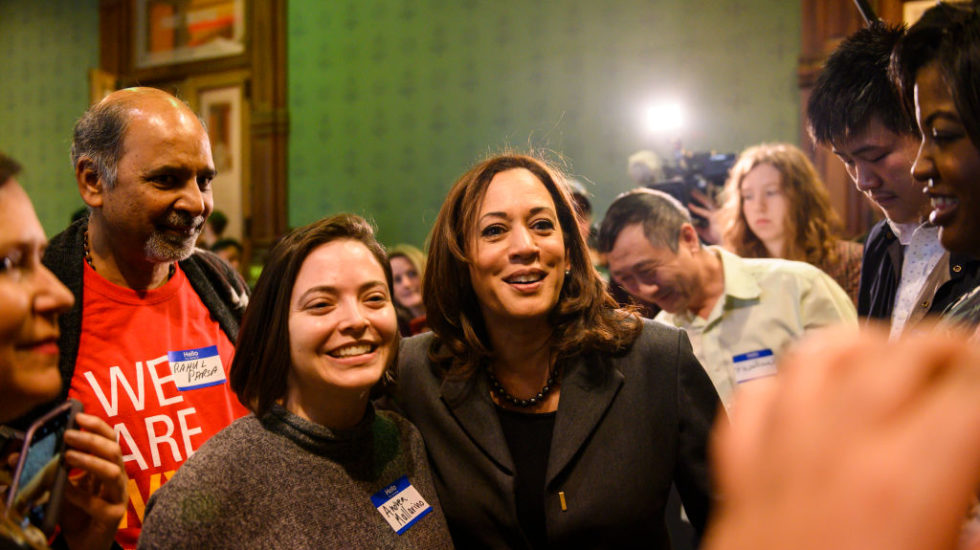After a weekend that started with the news that the Mueller report was in and wrapped with Attorney General William Barr’s controversial summary of the report to Congress, Democrats on Twitter seem, understandably, fixated on little else. And what about some of the bigger names in the running for the 2020 Democratic presidential nomination?
Go to Senator Kamala Harris’s Twitter feed, for example, and you’ll find this scathing indictment of how the Russia probe—oh, wait…
Pull up Senator Elizabeth Warren’s feed and you’ll see her taking Attorney General Barr to task for—oh…
What about the exciting new face in the race, Mayor Pete Buttigieg? Surely he’s looking to excite voters with a scorching hot take on Trump’s 2016 malfeasance and his subsequent obstruction?
Hmm…a montage of shots from his latest successful campaign stop, in a key primary state and 2020 general election battleground.
And a recent poll for the Des Moines Register found “[I]mpeachment talk has the lowest interest in the poll. Top issues for caucusgoers are health care, climate change and income inequality.
Look deeper through the past 72 hours of posts by these contenders and others vying for the chance to oppose Trump in 2020, like @CoreyBooker or @SenGillibrand or @SenSanders, and you’ll find a call or two for release of the full Mueller report, sure. But mostly you’ll see post after post calling attention to issues such as income inequality, health care, housing, racial division, gun violence, tax policy…and what these candidates plan to do about them.
Are the Democrats running for president out of touch with the pulse of their party faithful? Or are they, instead, mindful of polls such as this Gallup survey, taken on the eve of this past November’s midterm vote?
IMPORTANCE OF ISSUES FOR MIDTERM VOTING
- Healthcare 80%
- The economy 78%
- Immigration 78%
- Way women are treated in U.S. society 74%
- Gun policy 72%
- Taxes 70%
- Foreign affairs 68%
- Way income and wealth are distributed in U.S. 68%
- Brett Kavanaugh confirmation to the Supreme Court 64%
- U.S. trade and tariff politics 61%
- Climate change 53%
- Investigation into Russian involvement in 2016 election 45%
Are they, perhaps, making a distinction between the social media segment of their party’s base and the larger group of voters with more pressing concerns—who, if the questions gathered in advance of a HuffPost candidate forum are any indication, most want to hear the Democratic field talk about health care, student loan debt, and race issues?
FiveThirtyEight’s Nate Silver poses a similar question with regard to cable news:
Democrats are united in their strong opposition to Trump’s presidency—a recent CNN/SSRS poll has results in line with what has been a constant since the 2016 election, with 88 percent of respondents who identify as Democrats disapproving of the president. They want him out of the White House. And it’s fair to say that a good portion of them also want to see Trump held accountable for the hydra-headed corruption he’s brought to the executive branch. But there are strong indications that rank-and-file Democratic voters—let alone voters in general—care more about how the Trump administration is affecting them and America where more traditional, “kitchen-table” issues are concerned.
Exit polling from the 2018 midterms showed overall disapproval of President Trump, and overall greatest, specific concern with the issue of healthcare. Nancy Pelosi, who won back her House Speaker’s gavel with the Democrat’s big gains last year, has set a tone that walks the line implied here: Oppose Trump, conduct vigorous oversight via the relevant House committees—but keep the focus on legislative and policy issues, while putting impeachment talk on the back burner.
The line, for Democrats, stands between not disaffecting or dimming the energy of that part of their base that yearns most of all to see Trump held accountable and satisfying the perhaps larger segment that puts the greater emphasis on seeing his policies overturned. Looked at another way, however, that same 2018 exit polling points to an opportunity for the party’s 2020 presidential candidates: disapproval of Trump is already baked into a majority of the electorate; with Democratic voters, it’s at toxic levels. Whatever Mueller’s full report has to say—if and when the public gets to find out—and whatever happens with other investigations into Trump’s affairs between now and next November, it seems clear that 2020 will be, at heart, a referendum on the incumbent.
What Democrats agree on overwhelmingly right now is wanting a presidential candidate who will beat Trump. In a recent USA Today/Suffolk University poll, Democrats prized electability over ideological purity in a candidate by 55 to 35 percent. From where we stand now, with the Senate votes necessary for impeachment nowhere to be found (and the political implications of House impeachment without Senate conviction unknowable, but with Republican impeachment of Bill Clinton as a cautionary tale), Democrats’ best way to remove Trump remains, overwhelmingly, the ballot box.



